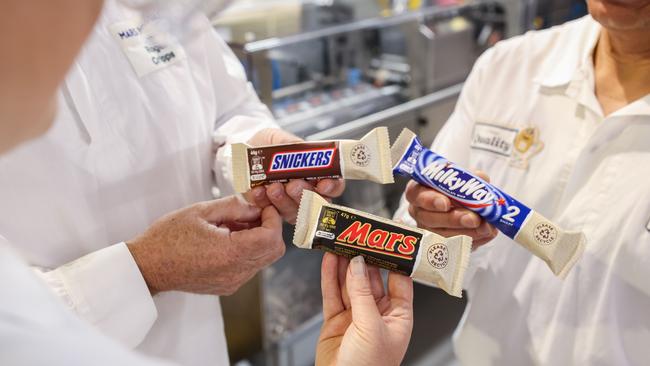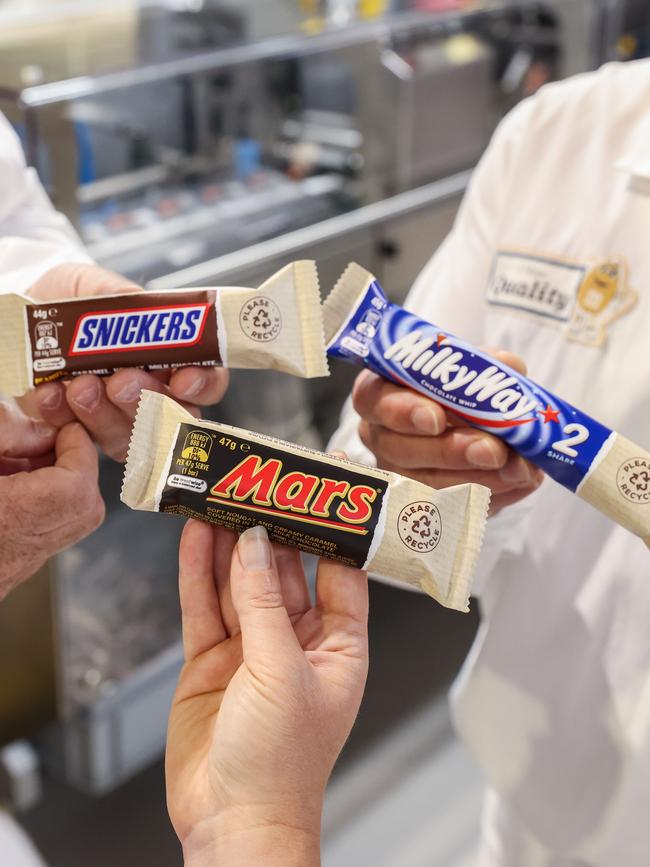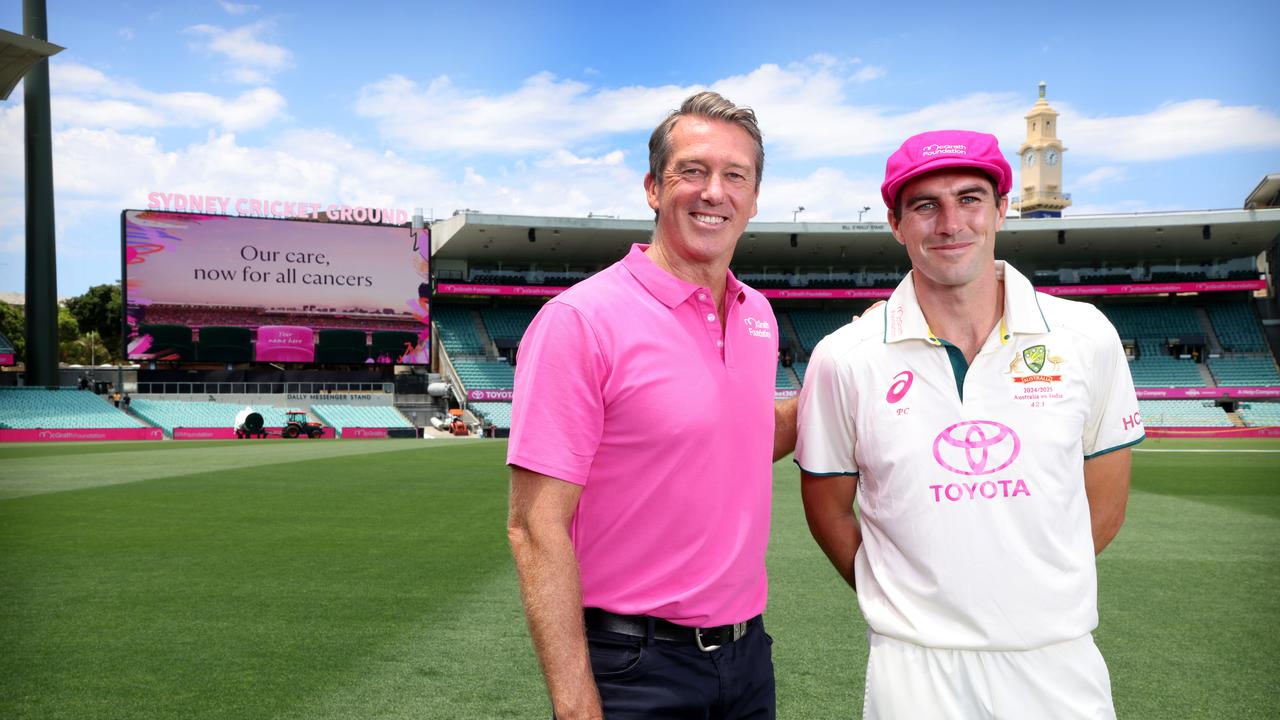Mars Wrigley launches paper-based packaging for Mars, Snickers and Milky Way bars
In a world-first for Mars Wrigley, the confectionery giant has sent its first batch of new paper-based packaged bars into the Australian market.

Seven million new paper-based packaged Mars, Snickers and Milky Way chocolate bars have been dispatched from Mars Wrigley’s Ballarat factory in Victoria, landing on supermarket and convenience store shelves across Australia since April 10.
As its consumer marketing campaign kicks in to gear, Mars Wrigley’s chief marketing officer Ben Hill told The Growth Agenda this moment was a significant one for the brand both locally and internationally; it marked a global first for Mars Wrigley since the business in Australia put its hand up as a test market for the new packaging in 2020.
Last week, the business announced a fresh investment of $28.8m into its Ballarat manufacturing capabilities. Since 2021, the business has invested more than $67m in the factory.
The marketing mix for the new paper-based packaging on the three chocolate bar brands includes an out-of-home campaign comprising street posters and billboards and a collaboration with Australian rap artist Kobie Dee.
It also ran a paid partnership with Rolling Stone magazine in print, online and on social media.
A separate website has also been created to educate consumers about how to recycle the new packaging, and also speaks to Mars Wrigley’s other sustainability practices, such as its support of Forest Stewardship Council and use of FSC-certified materials for its paper-based packaging.
“It’s a big shift. It’s a product-pack format that hasn’t historically been able to go anywhere except in the rubbish bin or, unfortunately, to waste streams,” Mr Hill said.

Mars Wrigley predicts that the new packaging will eliminate 360 tonnes of plastic from its value chain.
But the company now also needs to encourage individuals to change their habits and place their Mars, Snickers or Milky Way wrapper in the recycling bin (instead of general waste).
For this reason, Mr Hill said the size of the brand logo was reduced to accommodate for the recycle logo and the “Please recycle” call-to-action, which will remain on the front of the packaging throughout the next year at least.
Mars Wrigley’s campaign will appear on out-of-home advertising company Revolution360’s posters, which are also made from recycled materials and are 100 per cent recyclable. The ink used is biodegradable, and the glue is made from potato starch.
Josh Fitzgerald, national sales director said Revolution360 had seen a rising interest from brands across a wide range of categories in sustainable advertising materials, which is also being driven by consumer demand.
“I believe it is overall consumer sentiment regarding the environment,” Mr Fitzgerald said.
“People are voting with their wallets and supporting companies that are committed to being sustainable and snub brands that aren’t.”
He added the brief from Mars Wrigley marked a step change for the category: “It was their unique approach blending a focus on being cool by partnering with hip-hop artists while promoting being eco-friendly. It was a very different angle for a confectionary brand.”
Given that the initiative is a first for Mars Wrigley, Mr Hill said the business “may evolve the campaign” in real time, and that room for flexibility had been built into its marketing approach to respond and react as it unfolds.
Mars Wrigley tipped $2.5m into the development of the new packaging since 2020 and has not changed the price or formula of its products, it announced in November 2022.
“It’s certainly not a cost we’re passing on to consumers. We believe that based on our principles as a business that is the right thing for us to do. It’s the right thing for Australian buyer. It’s the right thing for the Australian consumer,” Mr Hill said.
“We know the retailers are very supportive of suppliers that are moving to more sustainable practices, so it’s one that we haven’t passed on, we’ve absorbed that into our P&L.”
As for the cost of plastic versus paper-based packaging, Mr Hill did not disclose a specific figure but said it was “a negligible difference.”

“We‘re trying to scale it up, obviously to a point where it can become more efficient. Our hope is that as more manufacturers, whether that be Mars globally or other local competitors, come on board with the move towards paper-based packaging that we should see scale come through the industry and bring the cost down.”
In January, Nestle also sent more than 250,000 KitKat chocolate bars wrapped in paper packaging as part of limited-run trial to Coles supermarkets in Western Australia, South Australia and the Northern Territory.
Coles sustainability general manager Brooke Donnelly said it welcomed the introduction of Mars Wrigley’s alternative packaging on to supermarket shelves.
“It’s encouraging to see Australian manufacturers take steps towards providing sustainable alternatives to plastic packaging,” Ms Donnelly said.
“In order to drive further innovation and achieve mutual sustainability goals, it’s important for organisations to collaborate and work together.
“With businesses increasingly measured on their impact on society and the environment, sustainable innovation can be a key driver of both societal and commercial success.”
All Australian-made king and medium size Snickers, Mars and Milky Way chocolate bars will be wrapped in the new paper-based packaging moving forward, and the business is working through transitioning all chocolate bar brands made out of Ballarat to the new packaging.
There are also plans to create recyclable packing for the smaller “fun” size bars in the future.
“For me, it actually shows great leadership in an industry to steer into these problems that are facing consumers, the environment, and ultimately, our businesses. I think it’s really important that marketers own that,” Mr Hill said.
“Our job has always been to develop solutions to consumer problems. And that’s not always a new product.
“Sometimes that’s an improvement to the way it’s presented.”







